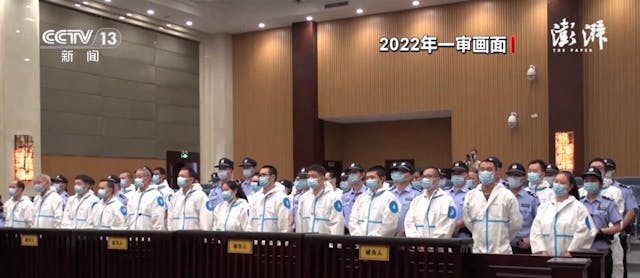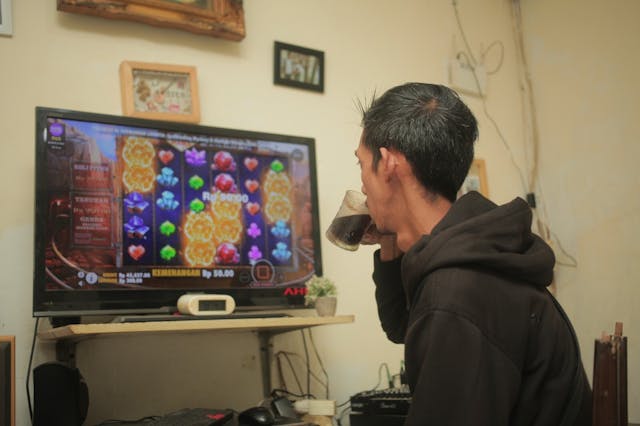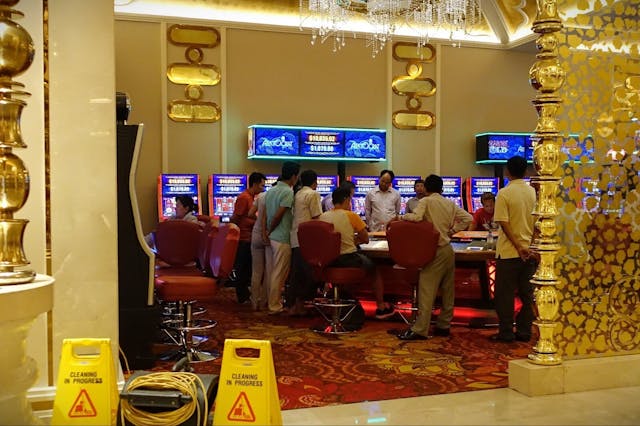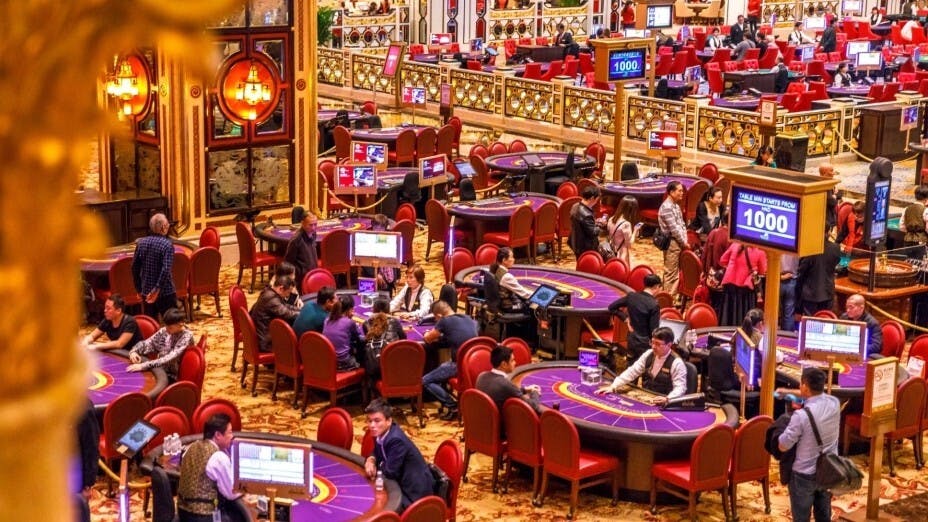2024年7月22日,中國最高人民法院公布了6宗跨境賭博案件的判決,其中兩宗涉及澳門的案件對中央處理跨境賭博活動,特別是非法賭博活動及洗錢非法收益具有重要影響。
發展內地人做「股東級代理」
第一宗案件涉及張某寧和鐘某新,他們於2007年被澳門一個賭博集團招募,建立一個網絡賭博平台。他們成為了這個澳門犯罪集團的「股東級代理」,集團成員數量相當可觀(見https://www.court.gov.cn/zixun/xiangqing/438871.html)。透過這兩名代理建立的組織,內地公民可親自前往或透過網絡在澳門賭博。該組織在內地設立資產管理公司,以換取賭博授信或籌碼,讓客戶可以賭博,並追討賭債。地下錢莊是為了貨幣兌換而設立的。截至2021年11月,該跨境賭博組織已發展股東級代理480名(其中內地公民280名),普通代理約6萬名(其中大陸公民3.8萬名),以賭博會員身份參與的人員6萬人。賭博資金總額為人民幣89億元。
該案由浙江省中級人民法院審理。法院認為,張某非法經營公司、非法買賣外匯、擾亂貨幣市場秩序,並觸犯法律。張某承認自己的罪行,最後被判處有期徒刑7年,並處罰金人民幣80萬元。鍾某被判處有期徒刑6年9個月,併處罰金人民幣300萬元。

黑社會性質組織成員跨境開賭
第二宗案件涉及虞某榮,他在1995年至2018年間,與其他65名成員組織黑社會性質組織,涉及在老撾開設賭場、非法買賣武器、組織他人偷越國(邊)境賭博,向跨境賭客勒索佣金。他和同夥參與網絡賭博直播,讓中國內地賭客同時下注。涉賭金額30億元人民幣,違法所得5000萬元人民幣。虞某及其成員甚至非法綁架、恐嚇負債累累的賭徒。
浙江省中級人民法院認定,虞某犯了組織、領導黑社會性質組織罪。被判處無期徒刑,剝奪政治權利終身。其財產被沒收,其餘65名成員依法處罰。
賭博網站利用網絡主播吸客
第三宗案件涉及鄭某和劉某,他們是菲律賓某賭博網站的代理。鄭某負責對與賭博網站以獲取鏈接,並計算佣金數額,劉某則利用其著名體育和網絡主播的身份,將網絡賭博連結發送給他的粉絲和追隨者,並幫助發展更多的賭博會員。2019年4月至2020年12月,雙方發展網路賭徒635名,收取佣金145萬元人民幣。
廣東省佛山市人民法院判決,兩人均犯刑事罪,各有期徒刑5年1個月,並處罰金80萬元人民幣。

第四宗案件中,唐某芬於2018年3月至2019年5月期間擔任馬尼拉某賭博網站代理,為自己及其他同夥招攬網絡賭徒,取得非法所得700萬元人民幣。
湖北省荊門市人民法院裁定凍結唐某芬及其11名共犯賭博資金141萬元。因唐某芬等5人主動從菲律賓回國,被從寬判處1年至3年以下有期徒刑,並處罰金人民幣1.5萬元至30萬元。
藉銀行帳戶轉賬非法所得
第5宗案件,胡某偉在柬埔寨參與網絡賭博犯罪,非法所得12億元人民幣用於回內地投資。他的同夥羅某明成為一名代理人和公司總經理,幫助管理運作、資本累積和匯款。
北京市人民法院判決兩人有罪,羅某明認罪後被判有期徒刑5年,並處罰金。
第6宗案件涉及胡某鑫,他與孫某程等人在澳門賭場組織黑社會性質組織,開設帳戶從事「洗碼」(博彩中介)業務,並多次邀集江西商人到澳門賭博。2014年,胡某鑫去世,但胡某鑫的同夥孫某程等人利用其妻的內地銀行帳戶轉賬,以分配澳門「洗碼」業務的違法所得。案發後,有關銀行帳戶最終被凍結,所有違法收益被沒收。

內地法院判案兩宗涉澳門
上述6宗案件中,有兩宗涉及澳門。第一宗案例展示了澳門賭博集團招募內地代理和賭客、組織內地賭客親自或透過互聯網到澳門賭博、設立內地資產管理公司、設立內地地下錢莊。據最高人民法院披露,涉及澳門的第6宗案件,是一些內地人在澳門賭場組織黑社會性質組織,透過內地銀行帳戶洗錢的違法活動。
另外4宗案件皆屬於在境外開設賭場或與境外賭博網站合作的模式,這些案件分布在老撾、柬埔寨、菲律賓等國。賭博犯罪的跨境性質與澳門案件類似,包括招攬代理和賭客、累積非法賭博資金和收益、以及向陷入債務的賭客追債。
最高人民法院強調,這6宗案件十分重要,因為它們涉及非法賭博、非法走私和非法敲詐勒索。所涉經濟犯罪為管理、隱匿、轉移非法賭博收益等。法院發表的聲明強調了習近平主席簽署的打擊跨境賭博犯罪的必要性指示。
綜上所述,這6宗案件及其相關法院判決充分體現了中國打擊跨國賭博犯罪的決心和嚴肅性。中華人民共和國刑法第303條規定:「以營利為目的,聚眾賭博或暫以賭博為業的,處3年以下有期徒刑、拘役或者管制,並處罰金。」因此,從法院對這6宗案件的判決來看,澳門與內地、外國與內地之間的跨境賭博活動,無論過去和現在都被禁止。
Analysing six mainland court cases of cross-border gambling
On July 22, 2024, the Supreme People’s Court of China published its judgments on six cases of cross-border gambling, including two cases related to Macau with important implications for how the central authorities have been handling cross-border gambling activities, notably the illegal solicitation of mainland clients in gambling, and the laundering of illegal proceeds.
The first case involved Mr. Zhang and Mr. Zhong, who were recruited by a Macau gambling syndicate in 2007 to set up an internet gambling platform. They became the “owners-level agents” of this Macau syndicate with a sizeable number of employees (see https://www.court.gov.cn/zixun/xiangqing/438871.html). Through the two agents’ organisation, mainland Chinese citizens went to gamble either in Macau in person or through the internet. An asset company was set up in the mainland to exchange gambling credits or chips so that the clients could gamble and that it could pursue the debts of clients. Underground banks were established for money exchange purposes. By November 2021, the cross-border gambling organisation developed 480 owners-level agents (including 280 mainland citizens), some 60,000 ordinary agents (including 38,000 mainland citizens), and 60,000 people who participated as gambling members. The overall amount of gambling capital was RMB$8.9 billion.
The case was trialed in the Intermediate People’s Court in Zhejiang. The court said that Zhang violated the law by illegally managing the company, illegally selling and buying foreign exchange, and disturbing the order of the monetary market. Zhang admitted his crime and eventually he was imprisoned for seven years and fined for RMB$800,000. Zhong was imprisoned for six years and nine months and he was fined for RMB$3 million.
The second case involved Mr. Yu who organised a triad-nature organization with 65 other members from 1995 to 2018, and who were involved in various criminal offenses, including the setting up of a casino in Laos, illegally selling and buying weapons, the smuggling of people across the border to gamble, and the extortion of commissions from those cross-border gamblers. He and his accomplices participated in live broadcasting of internet gambling so that mainlanders could put their bets simultaneously. The amount of gambling involved was RMB$3 billion with illegal proceeds of RMB$50 million. Yu and his members even illegally kidnapped and intimidated gamblers who ran into debts.
The Zhejiang Intermediate People’ Court decided that Yu committed the offence of organising and leading triad-nature organisation. He was sentenced to life imprisonment and was deprived of political rights for life. His properties were confiscated, while the other 65 members were penalised in accordance with law.
The third case involved Mr. Zheng and Mr. Liu, who acted as the agents of an internet gambling website in the Philippines. Zheng was responsible for directly interacting with the gambling organisation and calculating the amount of commission, while Liu used his status as a famous sports and internet host to send the internet gambling link to his fans and followers, and to help develop more gambling members. From April 2019 to December 2020, both developed 635 internet gamblers and collected commissions that amounted to RMB$1.45 million.
The Guangdong Foshan People’s Court ruled that both committed criminal offences and each of them was imprisoned for 5 years and one month with an overall fine of RMB$800,000.
The fourth case involved Ms. Tang who was an agent of an internet gambling website in Manila from March 2018 to May 2019, and who solicited internet gamblers and acquired illegal proceeds of RMB$7 million for herself and other accomplices.
Hubei Jingmen People’s Court ruled that Tang and her eleven accomplices’ gambling capital of RMB$1.41 million should be frozen. Because Tang and five members took their initiative to return to China from the Philippines, they were imprisoned leniently from one to three years and were fined from RMB$15,000 to RMB$300,000.
The fifth case involved Mr. Hu who participated in gambling crime in Cambodia and whose illegal proceeds of RMB$1.2 billion were utilised in investment back in the mainland. His accomplice Luo became an agent and company manager helping the processes of managerial operations, capital accumulation and monetary remittance.
The Beijing People’s Court ruled that both were guilty and Luo was imprisoned for five years with fine after he admitted his crime.
The sixth case involved Mr. Hu who set up a triad-like organisation with two persons in a Macau casino. They opened accounts to deal with gambling chips and invited businesspeople in Jiangxi province to go to gamble in Macau. In 2014, Hu died but his two accomplices used his wife’s mainland accounts to launder gambling proceeds. The bank accounts were eventually frozen and all illegal proceeds were confiscated.
Two of the six cases above involved Macau. The first case demonstrated the activities of the Macau-based gambling syndicate, such as the recruitment of mainland agents and customers, the organisation of mainland clients to gamble in Macau in person or through the internet, the establishment of mainland asset company, and the setting up of mainland-based underground banks, according to the Supreme People’s Court information. The sixth case that involved Macau showed a reverse activity of some mainlanders organising a triad-nature organisation in Macau’s casino and laundering illegal proceeds through mainland bank accounts.
The other four cases showed a pattern of setting up overseas casinos or collaborating with overseas internet gambling organisations, which were located in countries like Laos, Cambodia and the Philippines. The cross-border nature of gambling crimes was similar to the Macau cases, including the solicitation of agents and gamblers, the accumulation of illegal gambling capital and proceeds, and the pursuit of customers who ran into debts.
The Supreme People’s Court emphasised that the six cases were important because they involved illegal gambling, illegal smuggling and illegal extortion. The economic crimes involved were the management, hiding and transfer of illegal gambling proceeds. The court’s published statements emphasised a directive signed by President Xi Jinping in the necessity of cracking down on cross-border gambling offences.
In conclusion, the six cases and their related court verdicts demonstrate how China has been handling cross-border gambling crimes with determination and seriousness. Article 303 of China’s Criminal Law says: “Whoever, for the purpose of profit, gathers people to engage in gambling, runs a gambling house or makes gambling his profession shall be sentenced to fixed-term imprisonment of not more than three years, criminal detention or public surveillance and shall be fined.” As such, cross-border gambling activities from Macau to the mainland, and between overseas countries and the mainland, were and are disallowed judging from the court verdicts on the six cases.
原刊於澳門新聞通訊社(MNA)網站,本社獲作者授權轉載。原文網址:https://www.macaubusiness.com/opinion-analysing-six-mainland-court-cases-of-cross-border-gambling/















































